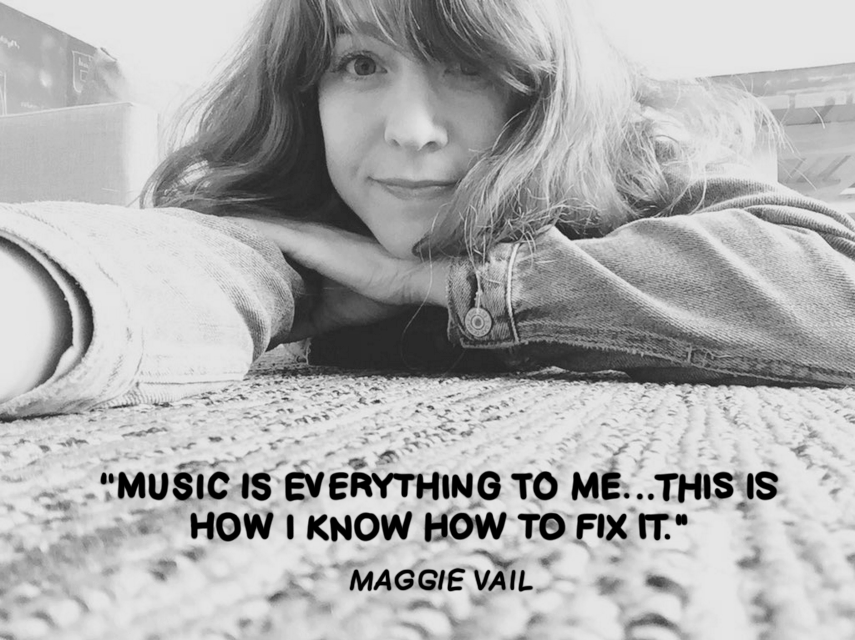|
An interview with Maggie Vail/ by Will Meyer

|
The word "platform" is often fetishized by alternative thinkers and technology pundits alike — but what does it mean? When I consider this word, I immediately think of a table: the desk in my room covered in records, magazines, and books. Other times I think of a raft, a homemade vessel carrying people down a river. A soapbox to stand on. As the word “platform” has taken on new meaning in the digital age, it has morphed into a fancy way to say the app on my phone or its “web version” better optimized for my computer monitor. And with that comes all sorts of consequences we need to think about: data mining, the surveillance state, and the booms and busts of venture capital.
But we can push back: platforms can be reclaimed, repurposed, and used for exciting projects. Platforms can be used to subvert capitalism. Here in The Media, platforms have been discussed in interviews with Astra Taylor and Holly Herndon, who both suggest that creating alternatives to dominant data-driven platforms has a radical potential.
As participants in a music community, how do we make this interrogation of platforms more tangibly relevant? Can punks team up with coders to create spaces that make more sense for our communities and radical values systems? As it turns out, this is already happening. See: the non-for-profit, open-source music sales platform CASH Music, developed by Maggie Vail and Jesse Von Doom in a former elementary school in Oregon with the legally binding objective of helping musicians (and not enriching investors).
“Music is everything to me… this is how I know how to fix it,” Vail says over Skype, reflecting on her own path: her years of involvement in the Olympia punk scene, playing in bands. . .
|
|
The debut Flasher tape

“What happens when the continuity of self and the worlds you come to depend on shatter? We want to find new ways of navigating unaccepting and oppressive narratives. We're trying to explore new forms of resistance, where being yourself ceases to be a matter of reliability and instead leans into emerging, shifting, and unsustainable senses of self. These songs are about doubling down on this kind of discomfort. These songs are tools for acceptance -- for each other, for our ‘bad’ ways -- at any cost.”
These are the words that Flasher -- a new DC band featuring Taylor Mulitz (Priests, Young Trynas), Emma Baker (Big Hush, Young Trynas) and Daniel Saperstein (Bless, Trouble) -- use to explain their debut, self-titled tape, out today in full on Sister Polygon Records. The cassette’s lead track "Tense” speaks to the energy that permeates this enormous collection of songs: criss-crossing vocals weave in and out of glistening post-punk that pushes and pulls, balancing moments of upfront, opposition with ominous dark-hued introspection.
“We're really proud of these songs, but this tape represents us just scratching at the surface of what feels like a deep and strange well of ideas we've discovered,” the band writes. “So far we haven't approached writing songs by pursuing a specific genre or style. We benefit from not having a concrete understanding of what Flasher is. The different sounds and textures that reveal themselves as Flasher-like are surprising every time. The task of bringing together (what can sometimes seem like) disparate styles into a cohesive vision is as daunting as it is exciting. Thinking with and through that sense of Difference (capital D) is central to our collaborations.”
The band debuted the song "Erase Myself" via The Spark Mag last week, and now you can hear the whole tape in full. . . .
|
 WEEKLIES
WEEKLIES

by Jolie M.A.
Anti-sex and beyond: on the nuances and unpleasantries of physical intimacy.

by Mackenzie Morris
"What I mean when I say I'm gay."

by Millie Lovelock
"I don't care about sex."
 Breaking updates from The Media.
Breaking updates from The Media.

by Mary Stankard
Up Yrs Fest
|